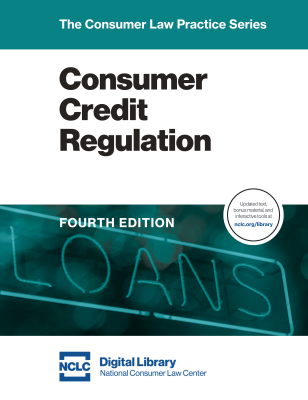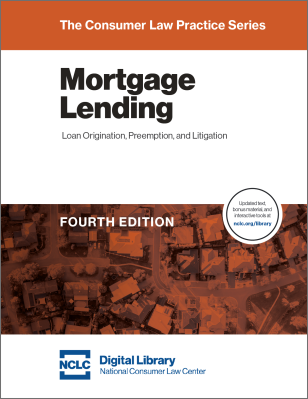Predatory lenders use rent-a-bank schemes to avoid the usury limits of the consumer’s state, by seeking to bootstrap onto federal rate exportation rights available only to banks. These predatory non-bank lenders claim that they are only arrangers or servicers of credit originated by a bank. NCLC’s Consumer Credit Regulation § 3.5.4 sets out several challenges to such arrangements—such as that the nonbank is the true lender or has violated state law as to arrangers of credit.
But what about state consumer protection laws other than interest rate limits?
Michael Ermilio, a Wisconsin consumer, sued rent-a-bank lender Transportation Alliance Bank (TAB Bank) over a 153% APR loan obtained at a mattress store. But the complaint did not attack the interest rate (and, in fact, Wisconsin does not cap interest rates). Instead, the plaintiff alleged multiple violations of the Wisconsin Consumer Act, including those:
- Prohibiting waiver of the right to bring a class action or injunctive relief;
- Prohibiting a contractual choice of law other than Wisconsin law;
- Prohibiting shifting attorney fees onto the consumer;
- Prohibiting a requirement that a consumer notify a creditor prior to bringing suit;
- Requiring a grace period prior to default;
- Requiring the creditor provide a copy of the contract before payments were due.
TAB Bank immediately offered judgment for $2,000 in damages, elimination of the debt, and attorneys fees.
What was going on?
This article focuses on less-known angles to challenge rent-a-bank schemes, based on the reality that federal preemption available to bank-originated credit is not so extensive as many predatory lenders and banks assume. When their assumptions are wrong, consumers may have powerful remedies to rectify predatory lending practices.
State-Chartered Banks Without Out-of-State Branch Networks Enjoy Only Partial Federal Preemption
While predatory lenders can use any FDIC-insured bank in a rent-a-bank schemes, at present, the banks engaging in high-cost rent-a-bank schemes are entirely state-chartered banks, not national banks or federal savings associations. The focus of this article is on them.
Like national banks, state-chartered banks have the right under federal law to export their home state’s interest rate laws to other states. Thus, if the state in which a bank is chartered does not cap bank interest rates or has a parity law allowing it to charge any rate that another bank can, then there is no effective limit on the rate that the bank can charge in other states. High-cost, nonbank lenders seek to piggyback on this rate exportation ability and use the state-chartered bank as a cover to make loans in those states, even when the consumers’ states’ lending laws would not allow such high rates for nonbank lenders.
But the state-chartered banks and the parties engaged with them in the rent-a-bank schemes may fail to consider whether they must comply with the credit requirements of the consumer’s state other than those dealing with interest rates.
National banks can avoid some state credit regulation beyond just that dealing with usury limits, to the extent that a state requirement prevents or significantly interferes with the bank’s exercise of its powers under the National Bank Act. See NCLC’s Consumer Credit Regulation § 3.2; NCLC’s Mortgage Lending Ch. 5. If a state requirement is preempted, the national bank instead complies with any applicable requirement of its regulator, the Office of the Comptroller of the Currency (OCC).
But the National Bank Act does not apply to state banks, so they cannot directly take advantage of the NBA’s preemption authority. The fact that state banks are insured by the FDIC also provides little or no federal preemption of state regulation, as the Federal Deposit Insurance Act (FDIA) does not generally preempt state laws. See NCLC’s Consumer Credit Regulation § 3.3.7.
Instead, for state-chartered banks, the federal Riegle-Neal statute, 12 U.S.C. § 1831a(j), is the primary source of federal preemption of state law other than that dealing with rate exportation. Riegle-Neal provides that, if a state-chartered bank has a branch in another state, then the laws of the state that hosts the branch, including laws regarding community reinvestment, consumer protection, fair lending, and establishment of intrastate branches, apply to the branch to the same extent as they do to the branch of an out-of-state national bank. 12 U.S.C. § 1831a(j)(1). In other words, if a state law is preempted as to an out-of-state national bank branch, then it is preempted as to an out-of-state state-chartered bank branch as well.
While this preemption for branch activities is problematic, it does not cover all activities of state-chartered banks, as discussed below.
Riegle-Neal Preemption Fails to Protect Rent-a-Bank Schemes If There Is No Bank Branch in the Consumer’s State
By the very nature of Riegle-Neal’s preemption language, the host state law is preempted as to the operation of a host state branch of an out-of-state, state-chartered bank. If the state-chartered bank participating in the rent-a-bank scheme does not have a branch in the host state, then Riegle-Neal does not apply. Nor does the interest rate exportation statute preempt state laws governing matters other than interest rates. Instead, the bank must comply with the host state’s non-interest rate laws. See NCLC’s Consumer Credit Regulation § 3.3.5. This rule applies whether the bank is conducting the lending activities completely on its own behalf, or is merely a fig leaf, as in a rent-a-bank scheme.
Riegle-Neal explicitly states that it “shall apply to any branch in the host State of an out-of-State State bank.” 12 U.S.C. § 1831a(j)(1). It does not state that it applies to out-of-state, state-chartered banks, but only to branches of such banks. Moreover, the heading for this statute in the U.S. Code is “(j) Activities of branches of out-of-State banks.”
The FDIC adopted by regulation the 12 U.S.C. § 1831a(j) statutory language at 12 C.F.R. § 331.3. In proposing that regulation, the FDIC stated:
the preemption provided by section [12 U.S.C. § 1831a(j)] only operates with respect to a branch in the host state of an out-of-state, state bank. By its terms section [1831a(j)(1)] and therefore the proposed regulation, would not apply if the out-of-state, state bank does not have a branch in the host state.
70 Fed. Reg. 60,019, 60,025 (Oct. 14, 2005).
This is a critical distinction because Riegle-Neal offers no preemption of host state law where an out-of-state, state-chartered bank has no branches in the host state. State banks involved in rent-a-bank schemes typically have few or no branches in other states, and no state banks have branches in all 50 states and the District of Columbia.
Federal regulations strictly define “branch” to mean a physical location: “any branch bank, branch office, branch agency, additional office, or any branch place of business located in” any state or dependency “at which deposits are received or checks paid or money lent,” and “does not include an automated teller machine or a remote service unit.” 12 U.S.C. § 1813(o).
A loan broker or other third-party arranging credit is clearly not a branch of a state-chartered bank. Nor is a bank employee soliciting business in the host state unless the bank employee does so from a physical location in that state.
Even if There Is a Branch, the Credit Must Be Primarily Extended from the Branch
If the out-of-state, state-chartered bank has a branch in the host state, but the credit transaction does not involve that branch, then Riegle-Neal preemption still should not apply. Again, as discussed above, Riegle-Neal applies to branch activities, not unrelated activities that take place in the bank’s home state.
Riegle-Neal explicitly provides preemption as to credit extended by a branch: if state law is preempted as to a national bank in the host state, then “home State law shall apply to such branch.” 12 U.S.C. § 1831a(j)(1). In other words, Riegle-Neal gives out-of-state banks parity with national banks only as to the operation of their host state branches. Nothing in Riegle-Neal extends this parity to an out-of-state bank if its host state branch is unrelated to the transaction.
Ironically, this rule places banks in a Catch-22. Rent-a-bank schemes have an incentive not to extend credit from the host state branch because the interest rate rules apply the law of the state where the bank that made the loan is “located,” and that location is determined based on where the primary lending activities took place. That is, a bank may lose its ability to export the interest rate of its home state where a credit transaction is primarily extended from a host state branch. See NCLC’s Consumer Credit Regulation § 3.5.5.3. Yet, if the loan is primarily extended from the home state, then the bank gains rate exportation rights but loses Riegle-Neal preemption as to non-interest rate laws.
A Host State Parity Statute Provides No Cover for the Rent-a-Bank Scheme
State banks that do not have branches in the host state or do not extend credit from those branches may attempt to claim that the host state’s “parity” or “wild card” statute protects them. These statutes give certain state banks the same rights and powers as a national bank operating in the state. Where a national bank can avoid a host state credit requirement, an out-of-state, state-chartered bank may argue that the host state parity statute gives it the same right as a national bank to avoid the host state regulation.
But typically, parity laws are aimed at protecting that state’s banks, not out-of-state banks. A host state parity statute may only give a host state bank the same rights and powers as a national bank, and does not relate at all to an out-of-state, state-chartered bank. Usually, when a host state’s parity statute references its application to a “state bank,” that term will be defined in the state’s banking statutes as applicable to banks chartered only in that host state. See NCLC’s Consumer Credit Regulation § 3.7.
Rent-a-Bank Schemes Are Vulnerable When Riegle-Neil Does Not Apply
Where Riegle-Neal does not apply, rent-a-bank schemes may violate any number of non-interest rate host state legal requirements–everything from overreaching creditor rights and remedies or other provisions found in credit agreements to requirements regarding licensing, security interests, and the terms of credit.
Of course, the out-of-state bank still has rate exportation rights, so it can charge the interest rate allowed by its home state laws. Whether a charge or fee is categorized as “interest” thus can determine whether host or home state law applies. When fees and charges are defined as interest is examined at NCLC’s Consumer Credit Regulation § 3.5.6.
Two recent cases demonstrate how rent-a-bank schemes can get in trouble with host state requirements when an out-of-state bank does not have branches in the host state. The Maryland Commissioner of Financial Regulation brought an administrative proceeding against a rent-a-bank scheme involving Fortiva Services, Atlanticus Services, and the Bank of Missouri (which had no branches in Maryland). The commissioner alleged that the bank violated a Maryland law requiring lenders doing business in Maryland to be licensed. Maryland is one of the few states that does not exempt out-of-state banks from its licensing requirements. The commissioner further sought as a remedy to make the unlicensed loans, including the principal, void and unenforceable.
When the defendants removed the state administrative action to federal court, the federal court ordered the case remanded back to the administrative agency. Salazar v. Fortiva, 2022 WL 1267995 (D. Md. Apr. 28, 2022). The court found that an administrative action is not subject to removal, the federal interest did not outweigh the state’s “substantial interest in regulating lending within its jurisdiction and in providing a forum for enforcement” of state law, and the licensure requirement does not involve interest, so rate exportation does not apply.
In the second case, Ermilio v. TAB Bank, described above, TAB Bank, after being sued over non-interest rate law violations, immediately offered judgment to cancel the debt and pay the consumer damages. TAB Bank, which does not have branches in Wisconsin, was represented by a major law firm with significant consumer finance experience, so it undoubtedly understood the legal landscape.
When Riegle-Neal Preemption Applies, It Is Only as Extensive as National Bank Preemption
It is worth remembering that Riegle-Neal preemption applies to a host state branch of an out-of-state, state-chartered bank only to the extent that a national bank can avoid a host state credit requirement. Such national bank preemption is itself limited and was significantly narrowed in 2010 by the Dodd-Frank Act. NCLC’s Consumer Credit Regulation § 3.2.4 discusses the extent to which national bank preemption applies to the following areas of state law:
- Licensing, registration and reports;
- Insurance and other credit enhancements or risk mitigants;
- Debt cancellation contracts;
- Loan-to-value ratios;
- Credit terms;
- Escrow accounts;
- Security interests;
- Credit reports;
- Disclosure and advertising;
- Disbursements and repayments;
- Non-interest fees and charges;
- UDAP, fraud, and other tort claims;
- Claims under state debt collection and repossession laws.
If national banks must comply with a specific host state requirement, then a state-chartered bank engaging in a rent-a-bank scheme must do so as well.
Worth Remembering—A Rent-a-Bank Scheme May Violate the Bank’s Own Home State Law
Even if Riegle-Neal preemption applies to a rent-a-bank scheme, the preemption does not get the bank and scheme completely off the hook. The transaction must still comply with the bank’s home state credit regulation—both as to interest rates and other aspects of the state’s credit regulation. While banks often select a state in which to obtain a charter based on that state’s lax usury requirements, they are less likely to do so based on state laws relating to other credit requirements. A predatory rent-a-bank scheme might not violate the out-of-state, state-chartered bank’s home state usury limit, but it may still violate other of its home state laws. However, many state lending laws exempt financial institutions.
One possible bank defense to such a home state law violation is a state bank’s home state parity statute that provides parity between a national bank operating in the bank’s home state and the state bank. But there are limits to this defense. It only applies if and to the extent that a national bank can evade the state bank’s home state requirement. And even then, the national bank must comply instead with any applicable OCC requirement. A state bank taking advantage of the state parity statute must also comply with the same OCC requirement.
In addition, the state bank’s home state parity law may be limited in any number of ways. Some state parity statutes provide additional bank rights only if the bank files with the banking department an intent to use specific rights. Other parity statutes require the banking commissioner to approve those additional rights or even to specify them in a state regulation. Courts may find no legislative intent for a parity statute to supplant a specific state law regulating credit. See generally NCLC’s Consumer Credit Regulation § 3.7. In addition, a home state parity statute may apply only to transactions occurring in the home state and not to out-of-state transactions.



